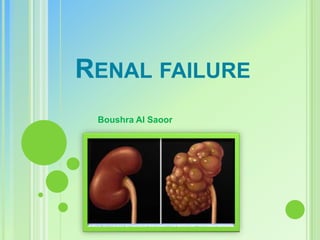
Kidney failure
- 1. RENAL FAILURE Boushra Al Saoor
- 2. Definition: kidneys are no longer able to clean toxins and waste product from the blood and perform their functions to full capacity. This can happen all of a sudden or over time.
- 3. Kidney failure can be classified as : Acute kidney failure Chronic kidney failure
- 4. First: acute renal failure: kidney function is lost rapidly and can occur from a variety of insults to the body.
- 5. Acute renal failure causes: Prerenal causes Renal causes Post renal
- 6. PRERENAL CAUSES: Due to decreased blood supply to the kidney. Examples of prerenal causes of kidney failure are: hypovolemia (low blood volume) due to blood loss. Dehydration (from vomiting, diarrhea, sweating, fever). poor intake of fluids. medication, for example, diuretics ("water pills") may cause excessive water loss . abnormal blood flow to and from the kidney due to obstruction of the renal artery or vein.
- 7. 2- RENAL CAUSES OF KIDNEY FAILURE (damage directly to the kidney itself) include: Sepsis Medications: Some medications are toxic to the kidney, including NSAIDs, some antibiotics ,iodine-containing medications such as those injected for radiology dye studies. Rhabdomyolysis: This is a situation in which there is significant muscle breakdown in the body, and the damaged muscle fibers clog the filtering system of the kidneys. this can occur because of trauma, crush injuries, and burns. Some medications used to treat high cholesterol can cause rhabdomyolysis.
- 8. 3-POST RENAL CAUSES OF KIDNEY FAILURE . Due to factors that affect outflow of the urine: Obstruction of the bladder -ureters can cause: back pressure to the kidneys. Prostatic hypertrophy or prostate cancer -- block the urethra and prevents the bladder from emptying. Tumors in the abdomen that surround and obstruct the ureters. Kidney stones. Usually, kidney stones affect only one kidney and do not cause kidney failure.
- 9. SECOND: CHRONIC RENAL FAILURE develops over months and years.
- 10. The most common causes of chronic renal failure are related to: poorly controlled diabetes. poorly controlled high blood pressure, and chronic glomerulonephritis. Less common causes of chronic renal failure include: polycystickidney disease. reflux nephropathy, kidney stones, and
- 11. What are the symptoms of kidney failure? organ failure caused by metabolic acidosis. Hyperkalemia which lead to fatal heart rhythm disturbances . Rising urea levels in the blood (uremia) can affect the function of a variety of organs(brain,,heart…) Generalized weakness may be due to anemia induced kindney failure. As waste products build in the blood-- loss of appetite ,lethargy, and fatigue become apparent. Progress to the point where mental function will decrease and coma may occur. Breathing becomes more rapid . congestive heart failure-- pressure , fluid in lung
- 12. How is kidney failure diagnosed? blood tests measuring the buildup of waste products in the blood - BUN, creatinine, and GFR are routine blood tests. used to measure the buildup of waste products in the blood. Urine tests Measure the amount of protein and concentration of electrolytes ultrasound can assess the size of the kidneys - identify whether any obstruction exists. Biopsy
- 13. What is the treatment for kidney failure? Prevention Once kidney failure is present. Diet Medications Dialysis Kidney transplantation
- 14. Prevention is always the goal with kidney failure. Chronic diseases such as hypertension and diabetes are devastating because of the damage that they can do to kidneys and other organs. Specific treatments are dependent upon the underlying diseases.
- 15. Once kidney failure is present: the goal is to prevent further deterioration of renal function.
- 16. Diet Since the kidneys cannot easily remove excess water, salt, or potassium, these may need to be consumed in limited quantities especially for: Foods high in potassium. Phosphorus is associated with calcium metabolism and may be elevated in the body in kidney failure. Too much phosphorus can leech calcium from the bones and cause osteoporosis and fractures. - milk, cheese, nuts, and cola drinks.
- 17. Medications. Medications may be used to help control some of the issues associated with kidney failure. But Once the kidneys fail completely, the treatment options are limited to dialysis or kidney replacement by transplantation
- 18. Phosphorus-lowering medications (calcium carbonate [Caltrate], calcitriol [Rocaltrol], sevelamer [Renagel]) Red blood cell production stimulation (erythropoietin, darbepoetin [Aranesp]) Red blood cell production (iron supplements) Blood pressure medications Vitamins
- 19. Dialysis Dialysis is life saving. Without it, patients whose kidneys no longer function would die relatively quickly due to electrolyte abnormalities and the buildup of toxins in the blood stream It cleanses the body of waste products in the body by use of filter systems.
- 20.
- 21. 1- Hemodialysis
- 22. Hemodialysis uses a machine filter called a dialyzer or artificial kidney to remove excess water and salt, to balance the other electrolytes in the body, and to remove waste products of metabolism. Blood is removed from the body and flows through tubing into the machine, where it passes next to a filter membrane. Three times a week and last a few hours at a time.
- 23. 2- Peritoneal dialysis
- 24. 2- Peritoneal dialysis Peritoneal dialysis uses the lining of the abdominal cavity as the dialysis filter to rid the body of waste and to balance electrolyte levels.
- 25. Kidney transplantation The patient will need to take anti-rejection medications that reduce the ability of the immune system to fight this forign body . The body can try to reject the kidney or the transplanted kidney may fail to work. As with any operation, there is a risk of bleeding and infection
